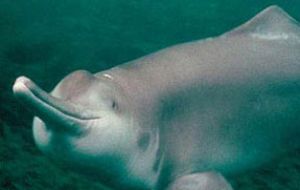MercoPress. South Atlantic News Agency
Bajii Yangtze dolphin “is functionally extinct”
 Bajii Yangtze dolphin
Bajii Yangtze dolphin The Baiji Yangtze Dolphin is with all probability extinct reports a scientific expedition from the Institute for Hydrobiology Wuhan, China, and the Swiss-based baiji.org Foundation. During six weeks they desperately searched the Yangtze River for a specimen but in vain.
The scientists traveled on two research vessels almost 3500 kilometers from Yichang nearby the Three Gorges Dam to Shanghai into the Yangtze Delta and back, using high-performance optical instruments and underwater microphones. "It is possible we may have missed one or two animals", said August Pfluger, head of Swiss-based baiji.org Foundation and co-organizer of the expedition in Wuhan. Regardless, these animals would have no chance of survival in the river. "We have to accept the fact, that the Baiji is functionally extinct. It is a tragedy, a loss not only for China, but for the entire world", said Pfluger in Wuhan. The expedition was led by China's Ministry of Agriculture and brought together world-class experts from institutes such as the Swiss Federal Institute of Aquatic Science and Technology (Eawag), the National Oceanic and Atmospheric Administration (NOAA), the Hubbs-Seaworld Institute from San Diego and the Fisheries Research Agency in Japan. The fate of the delicate dolphin is attributed to the destruction of their habitat, illegal fishing and collisions with ships. Regarded in China as the "goddess of the Yangtze", the 20 million year old river dolphin was one of the world's oldest species. The Baiji is the first large mammal brought to extinction as a result of human destruction to their natural habitat and resources. In the 1980s the Yangtze still had around 400 Baiji. However, the river dolphin became a victim of China's rapidly growing economy and a 1997 survey showed 13 confirmed sightings. The last confirmed sighting of a Baiji was in September 2004. QiQi, a dolphin male, who was rescued in 1980, died in July 2002 at the Institute of Hydrobiology in Wuhan. The baiji was for more than 20 years among the most disputed conservation issues between Chinese and western scientists. There has been especially in the nineties endless arguments and disputes about strategies how to save the species â€" whether to leave them in their natural habitat or capture and move them to a safe place like the Tian-e-Zhou Oxbow "Semi Natural" Reserve. "Now we do not have to discuss any longer. We have lost the race. The Baiji has gone", said August Pfluger Alongside the search for the Baiji, the scientists surveyed also the population of the endemic Yangtze Finless Porpoise, and the total was less than 400. «The situation of the finless propoise is just like that of the baiji 20 years ago», said Wang Ding, deputy director of the Institute of Hydrobiology Wuhan. "Their numbers are declining at an alarming rate. If we do not act soon they will become a second Baiji", said Wang Ding, deputy director of the Institute of Hydrobiology of the Chinese Academy of Science in Wuhan. However the decline of the Baiji and the critical situation of the finless porpoise appear to not be directly influenced by the water quality of the Yangtze. Within the framework of the Expedition, scientists from the Swiss Federal Institute of Aquatic Science and Technology did simultaneously investigate the chemical composition of the Yangtze river water and its particulate load. Scientists took both water and sediment samples from 30 different locations all along 1750 kilometers of the river and even when the Yangtze does have a high degree of pollutant build-up, at this time, as Beat Mueller from Eawag pointed out, there are no indications of toxic pollutants in high concentrations. The major project partners of the "Yangtze Freshwater Dolphin Expedition 2006" include SGS, Anheuser-Busch, SeaWorld, Ocean Park Foundation Hong Kong and the Swiss Agency for Development and Cooperation (SDC). Other sponsors include Canon, Fujinon, Garmin, Katadyn, KühneNagel, Pictet, Transa, Victorinox and Ziemann.




Top Comments
Disclaimer & comment rulesCommenting for this story is now closed.
If you have a Facebook account, become a fan and comment on our Facebook Page!